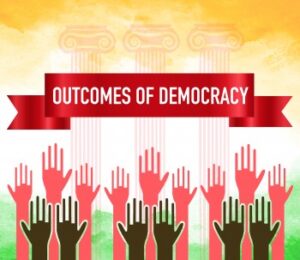Democracy is concerned with ensuring that people have the right to choose their rulers and have control over the rulers. When possible and necessary, citizens should be able to contribute to decision-making in a democracy. Democracy ensures that decision-making is based on norms and processes. A citizen has the right and the means to examine the process of decision-making. Thus democracy entails transparency.

Outcomes of Democracy:
- In a democracy, people have the right to choose their rulers and people will have control over them. Whenever possible and necessary, citizens should be able to participate in decision-making, which affects them all.
- It is right to expect democracy to produce a government that follows procedures and is accountable to the people. Democratic government develops mechanisms for citizens—regular, free, and fair elections, open public debate on major policies and legislation, and citizens’ right to information about the government and its functioning.
The dignity of Women:
The one way to ensure that women-related problems get enough attention is to have more women as the elected legislature. To achieve this, it is officially binding to have a fair proportion of women in the elected bodies. Panchayati Raj in India has reserved one-third of seats in local government bodies for women. In March 2010, the Women’s Reservation Bill was passed in the Rajya Sabha ensuring 33% reservation for women in Parliament and State legislative bodies.

